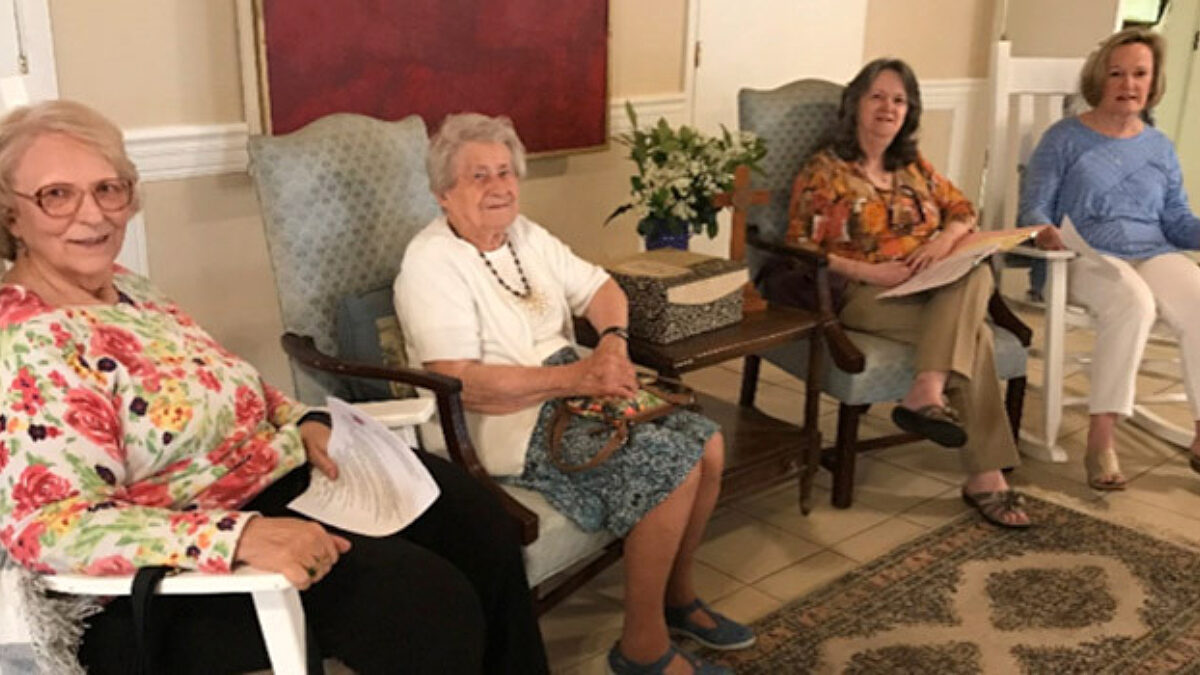
Grace United Methodist Church jail ministry reaches out in love
By Beth W. Kennedy
The Grace United Methodist Church Women’s Jail Ministry is comprised of mostly United Methodist Women, eight of them.
On any Wednesday midday, whether cold, hot, rainy or beautiful, four of the ladies gather at the church to prepare for another jail ministry to the Al Cannon Detention Center in Charleston. They review the materials to be shared from a “Purpose Driven Life,” “Here and Now,” the Gospel of John or other materials. After they pray for a meaningful service, they load into cars and head out for the jail.
As they arrive at the jail, they leave their pocketbooks and cell phones or anything else that could be considered contraband in the car. They hand their licenses to the officer in charge, who issues them a special pass. All eight women and three men involved in the men’s prison ministry from GUMC annually receive two-day training from jail personnel on rules and regulations and how to approach and interact with inmates. Members of the Jail Ministry are considered chaplains and must abide by the detention center rules.
As the GUMC women enter, there is no fear, and they are calm. They lay their totes containing religious materials, small scraps of paper and tiny golf pencils on the conveyer belt. All printed materials must be soft cover, and all staples removed. They enter the waiting area where an officer wands them to check for contraband. An escort then takes them to the cell block, where the inmates are housed.
As members prepare the room for the service, inmates are escorted into the room. There are two sections where services are held. One section is for non-violent offenders, and the other section is for violent offenders. Inmates’ incarceration may be because of driving under the influence, drug use or possession, prostitution, robbery, abuse, child neglect or other illegal actions. To participate in the ministry, inmates must be in good standing with the Al Cannon Detention Center and request attendance.
Upon entering the room, inmates are handed paper and pencils, which they use to write their prayers and requests. Their prayers focus on their families, a boyfriend or ex-other, a quick trial date, being drug-free when they return to society or having a place to go to when they are released. Most are thankful to have found God again and ask for his guidance.
Jail Ministry representatives collect the prayers and requests and take them to GUMC. They are placed in a special prayer box on the altar, and each Sunday the minster reminds the congregation to include them in their prayers. The Jail Ministry team prays for the inmates daily.
The jail service consists of an inmate reading a selection from the Bible or other source, followed by discussion. Often the inmates are well-versed in the Bible and read quite well. Inmates attending are in a dark valley of their lives and need hope. They are reminded that God loves them and he has a plan for their lives. If they have strayed, they may ask forgiveness and guidance from Jesus Christ, who died to save us all. However, they often have problems believing God will forgive anything. The service ends with the Sinner’s Prayer or other prayer.
Inmates say they find relief in the hour spent with the Jail Ministry sharing God’s word. It is the one time during the week they can break from their routine and feel closer to their faith or just freer. The Jail Ministry ladies say they often feel more blessed than the inmates to whom they have ministered.
The GUMC Jail Ministry is now in its fifth year. It evolved from a Bible Study and reading the book, “A Purpose Driven Church—Better Together.” When looking for a site to apply the book’s teachings, one member with a daughter who was working at the detention center suggested the center for the mission. The detention center has proven to be a great site for the Jail Ministry. It is indeed a mission field for a forgotten population.
Fear may stop some from considering a jail ministry, but one visit will put you at ease. Each of us can be a missionary right at home, by bringing the Gospel to a local, forgotten population. You will first need a group of devoted individuals. Next, you will need to contact the jail chaplain to determine if the jail would like to work with you and if it is suitable for your purpose. After that, you can work out the details such as day time, and number of visitors per visit.
One of the issues coming to the forefront in our ministry is the need to provide safe housing for inmates that have no home to go to upon release. This may be because of loss or a dangerous environment in the home. Homelessness was something that occurred to the GUMC women upon hearing the stories of the inmates hoping for new lives, free from all the things that had brought them to the detention center.
Jail Ministries can evolve into a community-wide project for this homeless problem. It would be a blessing to have other churches joining in this problem’s solution.
You do not have to go to a distant land to be a missionary. Rather, you can be a missionary right in your own backyard.